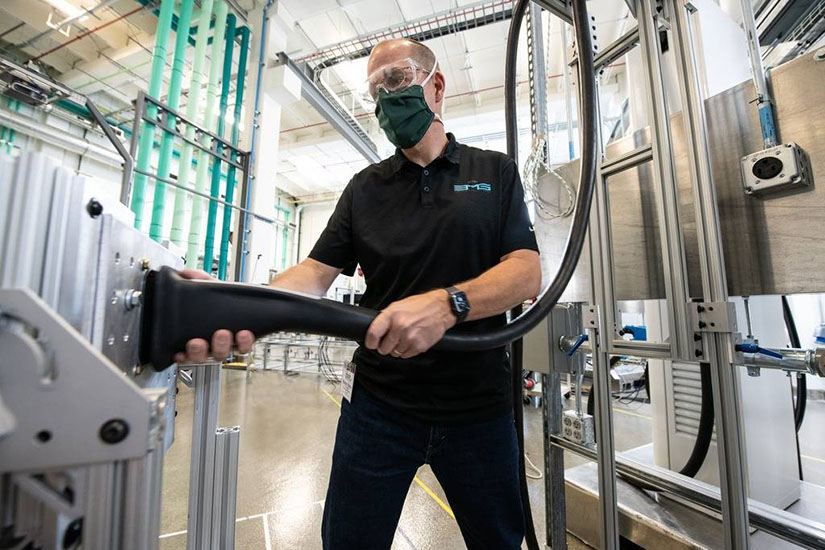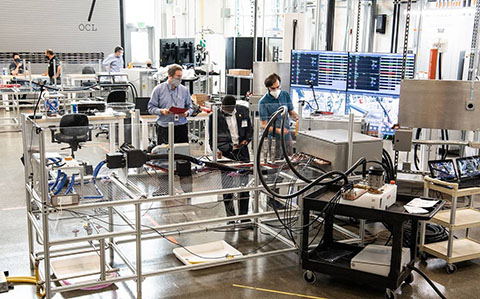NREL-Hosted Event Supports Industry Development of Megawatt Charging System Connectors

On Sept. 23–24, 2020, the National Renewable Energy Laboratory (NREL) joined forces with the Charging Interface Initiative (CharIN) to host a high-power electric vehicle charging connector test event.
Vehicle and electrical equipment manufacturers gathered to evaluate several prototype connectors and inlet hardware as part of an industry effort to develop the Megawatt Charging System (MCS), a new charging standard for medium- and heavy-duty electric vehicles. Results from the tests will help inform the development of interoperable connector and inlet designs. An industry standard for megawatt chargers will streamline the introduction of commercial electric vehicles by providing fleets with stability and certainty in accessing infrastructure globally.
The unique capabilities at NREL’s Electric Vehicle Research Infrastructure (EVRI) in the Energy Systems Integration Facility (ESIF) enabled seven vehicle inlets and 11 charger connectors to test their designs together. NREL’s facilities offer a convening location to compare components across the seven different manufacturers represented by prototypes in the hardware evaluations with another six manufacturers participating virtually. In addition, NREL boasts an extensive history of novel advanced thermal systems for power electronics, providing valuable feedback on the performance and thermal characterization of the hardware designs. NREL scientists are leading experts in the realms of 1+MW charging and extreme fast charging for electric vehicles.
“NREL’s industry-leading capabilities and experience in electric vehicle charging and commercial vehicle electrification provided the perfect backdrop to assemble multiple companies for the review of charging designs,” said Andrew Meintz, the NREL researcher in charge of organizing this event.
Event attendees first took note of the fit and ergonomics of the connector designs, providing feedback on how easily they could connect and disconnect the connector from the inlet itself. Attendees also considered how to keep connectors from getting damaged over time. Event takeaways include suggestions for cable retention or overhanging connectors to prevent connector drops and cables from dragging on the ground. The high-current nature of this system presents unique challenges to minimize cable length to improve efficiency and reduce thermal cooling requirements while maintaining a light and easy to use connector.

Researchers evaluate megawatt charging connector systems on the liquid-cooled (near) and air-cooled (far) test-benches. Photo by Dennis Schroeder, NREL
The event also included a functional evaluation of the thermal performance of the connectors and inlets. Before the event, NREL provided virtual component inspections to review hardware with individual suppliers. Researchers performed a functional precheck with all supplied hardware at the event to confirm function before an in-depth evaluation test matrix covering all connector and inlet combinations. The results from this review are shared with the hardware developers to facilitate improvement to the designs to ensure consistent performance across connector and inlet designs. The event was followed by a virtual task force meeting to review the evaluations.
CharIN is a non-profit association that brings together industry experts to develop international charging standards. The CharIN group has identified a list of priority requirements for a new high-power bidirectional charging system, including compatibility with up to 1,500 volts and 3,000 amps. This event was sponsored by the Department of Energy; the California Energy Commission; the South Coast Air Quality Management District; Daimler Trucks North America; Gladstein, Neandross & Associates; and CharIN. The association's goal is to rethink existing systems and incorporate various international standards to evolve charging standards for medium- and heavy-duty electric vehicles.
Learn more about NREL’s transportation and mobility research and electric vehicle grid integration work.
Last Updated Jan. 22, 2026
